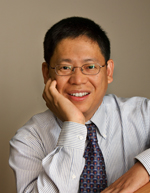Younan Xia, Ph.D., the James M. McKelvey Professor in the Department of Biomedical Engineering, was traveling in Korea when he got an e-mail from the editor of Angewandte Chemie, the journal of the German Chemical Society, congratulating him on being ranked as one of the top 10 chemists in the world by Times Higher Education, a magazine based in London.
It was news to Xia.

Xia
The ranking is based on the number of papers published in journals in the last decade, the number of times those papers are cited, and, critically, the citations per paper. (The publication statistics were compiled by Thomson Reuters, a business and professional information service.) Xia, who ranked fifth, published 140 papers that were cited an average of 75.14 times per paper.
Xia, also a professor of chemistry in Arts & Sciences, characteristically downplays the honor. He ranks high, he said, in part because he is in the “hot” field of nanotechnology. Someone in an older field might be doing stellar work and be cited less often because there simply are fewer scientists reading the literature in that field. He thinks reputation, though impossible to rank, is ultimately more important than publication statistics.
And as a scientist, he winces a bit at the number of significant figures in his citation number. “Is the ranking really accurate to four places?” he asked, laughing.
But, it turns out, he knows many of the other top ten chemists. One is a close friend who went to the same university in China; another is his doctoral and postdoctoral fellowship adviser at Harvard University; and a third was on sabbatical at Harvard when Xia was a student there. He knows some of the others on the list as well.
The irony of it all, he said, is that he became a chemist by accident. He intended to be an engineer but, as he told thescepticalchymist, the chemistry blog for the journal Nature, on the advice of his high-school physics teacher, he switched to a chemistry major at the last second. In the Chinese system, he said, the choice of major at the beginning of higher education is pretty much irrevocable.
“In retrospect,” he said, “I think this last-second change completely changed the trajectory of my professional career, as well as my life.”
It was his appointment at Washington University that finally allowed him to realize his dream.
After 25 years as a chemist, he switched to biomedical engineering when he moved to WUSTL in 2007. These days, he works on novel nanomaterials useful for biomedical applications. Chemistry is involved, but so, to his satisfaction, is engineering.